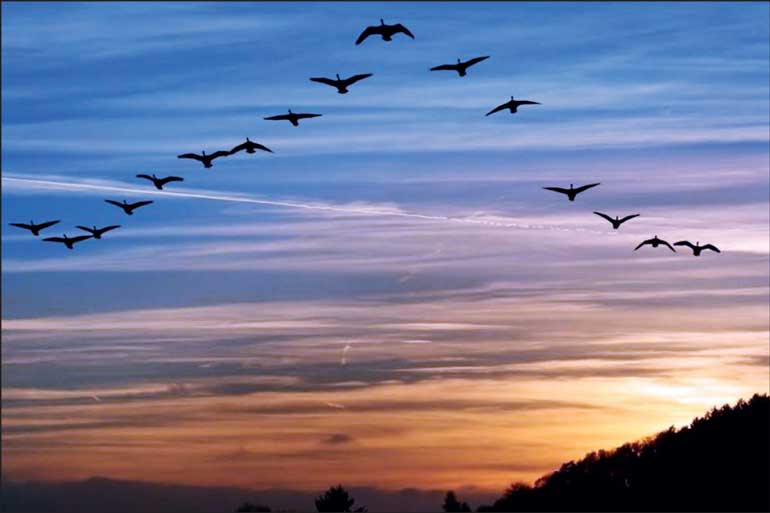Tuesday Feb 17, 2026
Tuesday Feb 17, 2026
Saturday, 17 August 2024 00:17 - - {{hitsCtrl.values.hits}}

Would it make a difference on how we view nations, communities and individuals if we pay more attention daily to the natural world?
Nations across the world commemorate a national day/independence day or constitution day alongside patriotic sentiments and much money is spent on these events which are often grand ceremonies. There are flags that are hoisted alongside military parades and other celebrations according to the culture of the land. Sri Lanka commemorated its independence day on 4 February and this island’s immediate neighbouring countries India and Pakistan on 15 August and 14 August respectively.
Freedom is the most expensive luxury on this abundant earth – which freely feeds everyone without discrimination. Would it make a difference on how we view nations, communities and individuals if we pay more attention daily to the natural world – for example the birds of air and the fish of the sea? These living beings bask in survival free of demarcations, borders and boundaries.
The birds of air are the threads of all rainforests of this world – as they contribute to the upkeep of human breath by distributing seeds on earth which grow to be foliage that provides oxygen and food. The fish sacrifice their lives to keep us fed. They need no visa. They pay no tax. They have no flags.
Across time man has forgotten the oneness that tethers him to each other and to the entire universe. But at each epoch of human existence there have been seers, sages, mystic poets and boundary-less wanderers for whom the desert and the seas were but one tapestry as they sojourned the body of this earth searching for its soul.
The soul of a mystic cannot be caged to the narrow bars of ethnicity, caste or creed. This is why poetry of those such as Kabir, Rumi, Rabindranath Tagore and teachings of those such as Shams of Tabrizi (the teacher of Rumi) are relevant as timeless tonic to human hearts divided by territorial borders and current day human made conflicts.
Each life cycle in itself is one long poem. According to the tradition of Buddhism, the Sanatana Dharma (Hinduism) and several other belief systems such as the ancient Celtic-Druid faith, the energy that powers the human body transfers itself as fitting into other life carrying ‘vehicles’ (the human form) from the very onset of embryo formation.
If one contemplates from this angle we will confront the epiphany that we have no control who we are born as. That we did not pre-order to be a Sinhalese, or Tamil or Muslim, or Icelandic or African or Western. That we did not sit in some esoteric beauty parlour of eternity and demand that we have fair skin or dark. Or whisper that we wanted an in-between tan or a shade of the palest hue.
We certainly could not command to be born to monarchy or a ‘superior’ race. Having thus been helpless in inheriting our human form and the caste, race, creed and social class which shapes the lived in human ‘identity,’ it does seem inane to be so attached to its confines.
With some deep and unfettered contemplation, maybe in near proximity to some of the wondrous mountains that decorate this entire earth – we may end up at the signposts all artistes draw their inspiration from – that all of us humans live under one vast sky, energised by the same sun, under the benevolent gaze of the same ethereal moon and under the watch of those glinting eyes of heaven- the stars which awake on the dark sheen of our night’s sleep. And when we realise this we will see the entire ocean as a pond and the whole earth as our playpen. Our worldview will be one of joy, unity, love and empathy.
Last week this writer had the most interesting experience of being up in the sky (paragliding). Paragliding is the closest one can come to flying as free as a bird. The experience of this sport signifies the epitome of what freedom could be. We will be writing in detail on paragliding as a complementary factor to tourism and peacebuilding across the SAARC region in our upcoming editions. But the mention of paragliding at this point was to draw parallels with the concept of freedom that our friends with wings (the birds) enjoy to soar among the clouds.
Therefore as we reflect on notions of independence let us plunge into the depths of this word with wings of non-bias.
As we end this piece of writing we quote in anonymity the heartfelt words of a tourist police constable on a mountain terrain that divide Sri Lanka’s two close allies India and Pakistan;
“This world is strange. My two sisters are on the other side. I cannot go there. Because I am in the police of this country. I am a citizen here. My two sisters are citizens there. In that country. I think you see the pain in my eyes. There are many stories like this. I cannot see my sisters and social media does not fill the gap of closeness we had as children. But we live and we pray for a day when we see each other more. Yes, these are beautiful mountains. I am glad you like them. Many Sri Lankans come here. I have never been to Sri Lanka. Maybe one day I visit with my sisters. There are mountains in Sri Lanka as well, isn’t it? The mountains speak so much while remaining silent. If you read my eyes you will hear the sorrow that I cannot speak when I miss my sisters and their children.”